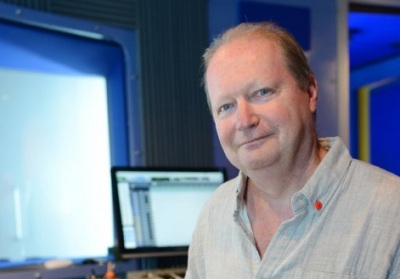
|
A Walk in Downton Abbey
-Before anything, thank you very much for granting us this interview, John. Here in Spain, there are a lot film music fans that loves your music for Downton Abbey. How did your interest in music begin, and of course for film music?
-Tell us a bit about your origins in this world, and about your first works…was The Gift (episode for TV Series «The Play on One») your first contact with film music? -In the 1980’s I played in various experimental music groups, probably the best known was Man Jumping, but I ended up writing a lot of music for contemporary dance ensembles, notably Ballet Rambert and London Contemporary Dance Theatre and from there it was a logical step to working on TV and Film. I sent a showreel to a producer I had met years before in Glasgow, where I had studied. He was producing The Gift and a composer they were using was either fired or pulled out. My showreel landed on his desk at just the right moment. He phoned me and I haven’t really stopped ever since. Extremely fortuitous. -1994, you appear as Music Consultant in Mike Newell´s Four Weddings and a Funeral. Exactly… what was your work for this film? -I worked as a music editor, mainly trying to find the right temp music for the show while they were trying to sell it to the Americans. I worked very closely with both the Director and Producer. I have been told I came very close to being offered the final job, but I’m not sure that is entirely true. That would have been too big a break, too soon! -Since 1993 until today, we can see you have a long career for TV, specially for BBC. Obviously you feel very comfortable working for this audiovisual media. Is there a good reason for this? In my opinion, TV series from UK are always better than most of the movies that we can see actually. With an impeccable making and a great actors and stories. -I think it is partly to do with budgets, there is still a strong commitment to use real musicians to record the music for TV in the UK particularly in period drama. Also the extended length of a series gives one a lot of scope to explore the musical material. -Let us focus on your work for the hugely successful TV show Downton Abbey. Tell us about your implication in this project.
-As a TV show with several seasons and several directors; Who is the people who talks with you about the music for each episode, the director or Julian Fellowes? Is easy to work with them? -I hardly talk to any of the directors, I mainly deal with the the producer Liz Truebridge and the Exec Producer Gareth Neame. Between us we decide where we think we need music and what it’s function should be. I then make QuickTime demos of all the cues before we finally commit to a proper recording. I think the feeling is that since I’ve now done over 30 hours of Downton nobody knows better than I how the music works. -Tell us how is a recording day to a Downton Abbey´s episode. Which are the deadlines to score each of them?
-Listening to the «Main Titles», I feel a lot of emotions. This theme describes perfectly all the things that happens in that house: love, drama, friendship, lordship, servitude, sadness, happiness… In my opinion it´s another main character in this story. Was a hard work writing this theme? Tell us about this point? -It was hard work but I think it was probably the third attempt which isn’t bad going, I knew I had it immediately. It all comes from the first scene in episode 1, the motion of the train, a telegram, a lone man in the carriage (Bates), on his way to Downton for the first time, apprehensive, not sure what to expect, we follow the telegram which leads us to the house where the music opens out into a large cadence. The Titles were compiled from that same material. -Is there a special theme and a special episode for you? Why?
-Even though it has nothing to do with the music. I am curious to know what´s your favorite Downton Abbey´s character. Mine is Violet Crawley, Dowager Countess of Grantham. I love Maggie Smith. -I’m very fond of Lady Mary (Michelle Dockery) and Anna (Joanne Froggatt). I think they’re both fantastic actresses and I love writing music for them. -Have you ever spoken with someone of the cast about your work for the series? -Yes, I think I’ve spoken to all of them. I have spent quite a bit of time on set organising some of the music which you see in vision, ie. Shirley MacLaine singing in Series 3 and Lady Mary in series 2, in both cases I’m actually playing the piano live in the room. -The release of the CD «Downton Abbey – The Essential Collection» was a wonderful news for film music fans, and I suppose that you will be proud for this. Who proposed the idea of recording this wonderful disc? I´m sure that is so hard and there is a lot of work involved and many people take part in making this kind of record.
-In tracks 6, 9, 11, 12, 13, 16, and 18 you play (wonderfully) the piano. Is your favorite musical instrument? When you are writing music, do you use that instrument or a computer? -Yes, the piano is my instrument and I use it to compose virtually everything. I use the computer to make an orchestral emulation which is indispensable, and I always compose to the picture with the dialogue, it’s the only way get it right. -Coming to the end of the interview. Explain what meant to you winning two Emmy Awards for this soundtrack.
-Finally, what does John Lunn´s future look like? Are there many projects on your agenda? -I’m just finishing series 4, I haven’t stopped working for nearly 2 years so I’m taking a break, there are quite a few projects in the pipeline but nothing I can really talk about at the moment. -John, thank you very much for your consideration. It has been a real pleasure to talk with you, here in BSOSpirit. Would you like to send us a few last words for fans of your work here in Spain? -I absolutely adore Spain, particularly Seville. My wife and I try to go there every couple of years, but not in the summer! I’m from Scotland, it get’s too hot! Also I love Spanish food and football, equally! (Thanks to Sergio Rivas for reviewing the text) |
Author
BIO: John Lunn (born 1956) is a Scotish composer, known for his soundtrack work for television. He was formerly a member of «systems music» band Man Jumping. His work includes music for the television series Hamish Macbeth (1995), Lorna Doone (2000), North Square (2000), Hotel Babylon (2006), Downton Abbey (2010), Waking the Dead (2011), Dreamlands (2011 ) and The White Queen (2013). His music for Sky TV’s Going Postal was winner of Best TV Score in the 2010 RTS Awards and was nominated for a BAFTA and an Ivor Novello award. He was nominated for a BAFTA Award for Outstanding Original Score for adaptation of Dickens’ Little Dorrit. His music for Downton Abbey has meant two Emmys, in 2012 and 2013, an ASCAP Award, and a BAFTA nomination

Go to the review |


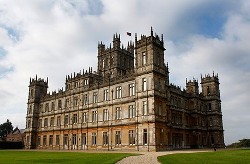 Best known in Spain for his work for TV show Downton Abbey, John Lunn’s music possesses a wonderfully unique voice that spans the spectrum of musical styles. Classically trained yet contemporary in attitude, he combines a highly intelligent and sensitive approach, with a sound that always hits at the emotional heart of a piece. Along with the highest production values, and a continual desire to discover new colours and sounds, it is not hard to see why John is continuously in such high demand.
Best known in Spain for his work for TV show Downton Abbey, John Lunn’s music possesses a wonderfully unique voice that spans the spectrum of musical styles. Classically trained yet contemporary in attitude, he combines a highly intelligent and sensitive approach, with a sound that always hits at the emotional heart of a piece. Along with the highest production values, and a continual desire to discover new colours and sounds, it is not hard to see why John is continuously in such high demand.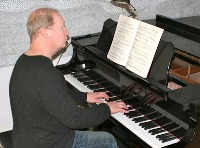 -My father played the saxophone so I was introduced to Jazz at a very early age, but I didn’t actually start playing a musical instrument till I was 14 after hearing Paul Tortellier play the 3rd Beethoven Cello sonata. I went along to school the next day to ask for cello lessons, there were no vacancies but I was offered double bass. This turned out to be a stroke of luck. I learned a lot about harmony and musical construction because I was constantly underpinning the rest of the orchestra. I can’t remember when my interest in Film music actually started but I can recall being very impressed by films like The Go-Between and The Servant and also Kubrick‘s use of existing music in 2001, The Shining, etc. I could see the power that it held.
-My father played the saxophone so I was introduced to Jazz at a very early age, but I didn’t actually start playing a musical instrument till I was 14 after hearing Paul Tortellier play the 3rd Beethoven Cello sonata. I went along to school the next day to ask for cello lessons, there were no vacancies but I was offered double bass. This turned out to be a stroke of luck. I learned a lot about harmony and musical construction because I was constantly underpinning the rest of the orchestra. I can’t remember when my interest in Film music actually started but I can recall being very impressed by films like The Go-Between and The Servant and also Kubrick‘s use of existing music in 2001, The Shining, etc. I could see the power that it held.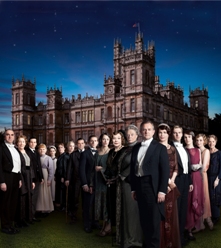 -I get roughly 3 weeks per episode which has to include recording and mixing. Each episode will require a 3 hour session with an orchestra of 18 violins, 6 violas, 6 violoncellos, 3 double bass, a French horn, vibraphone and for this 4 series a soprano saxophone. All the instruments are performed live except for the piano which I overdub myself later on, mainly because once we’ve recorded the real musicians I need to think how much piano we really need.
-I get roughly 3 weeks per episode which has to include recording and mixing. Each episode will require a 3 hour session with an orchestra of 18 violins, 6 violas, 6 violoncellos, 3 double bass, a French horn, vibraphone and for this 4 series a soprano saxophone. All the instruments are performed live except for the piano which I overdub myself later on, mainly because once we’ve recorded the real musicians I need to think how much piano we really need.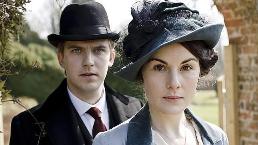 -Series 2 episode 2 the train station with Mathew and Mary where they depart unable to express their love for each other knowing they may never see each other again. The music cue became «Such Good Luck» on the Downton Soundtrack Album and I also made a song from it, sung by Rebecca Ferguson, with lyrics by Don Black.
-Series 2 episode 2 the train station with Mathew and Mary where they depart unable to express their love for each other knowing they may never see each other again. The music cue became «Such Good Luck» on the Downton Soundtrack Album and I also made a song from it, sung by Rebecca Ferguson, with lyrics by Don Black.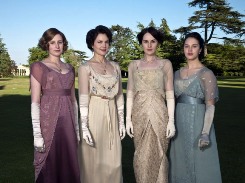 -Yes, I’m really pleased with the recording of this record, it was a lot of work, we were going to produce another one this year but we’ve decided to wait so we have an abundance of new material after series 5.
-Yes, I’m really pleased with the recording of this record, it was a lot of work, we were going to produce another one this year but we’ve decided to wait so we have an abundance of new material after series 5.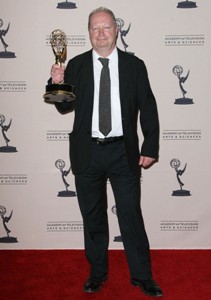 -I think it’s safe to say that winning it two years in a row means the first win wasn’t a fluke!
-I think it’s safe to say that winning it two years in a row means the first win wasn’t a fluke!
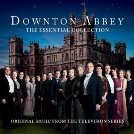
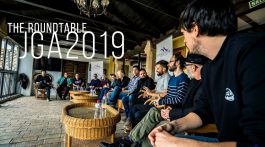
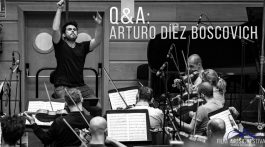
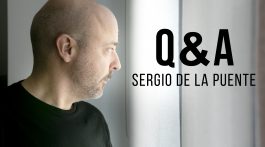
No hay comentarios